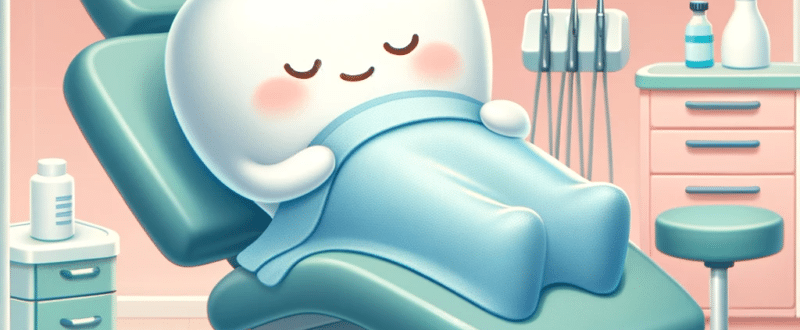Sleep Sedation Dentistry
For many of us, the thought of visiting a Brisbane dentist can bring on feelings of anxiety. But what if there was a way to drift off into a peaceful sleep and wake up with all the work done? Welcome to the world of sleep dentistry, where anxious patients can receive dental care without the associated pain or stress.
In this blog post, we’ll dive into various frequently asked questions about sleep dentistry and how it uses general anaesthetic to make patients completely unconscious during their dental treatment.
According to Brisbane Sleep Dentistry Clinic, sedation dentistry is becoming increasingly popular as most patients find it a comfortable way to maintain oral health. Many dental specialists now offer sleep dentistry as part of their comprehensive dental care services.
So, read on if the buzz of a dentist’s drill or the mere thought of a dental chair makes you uneasy. It might just be the solution you’ve been hoping for!
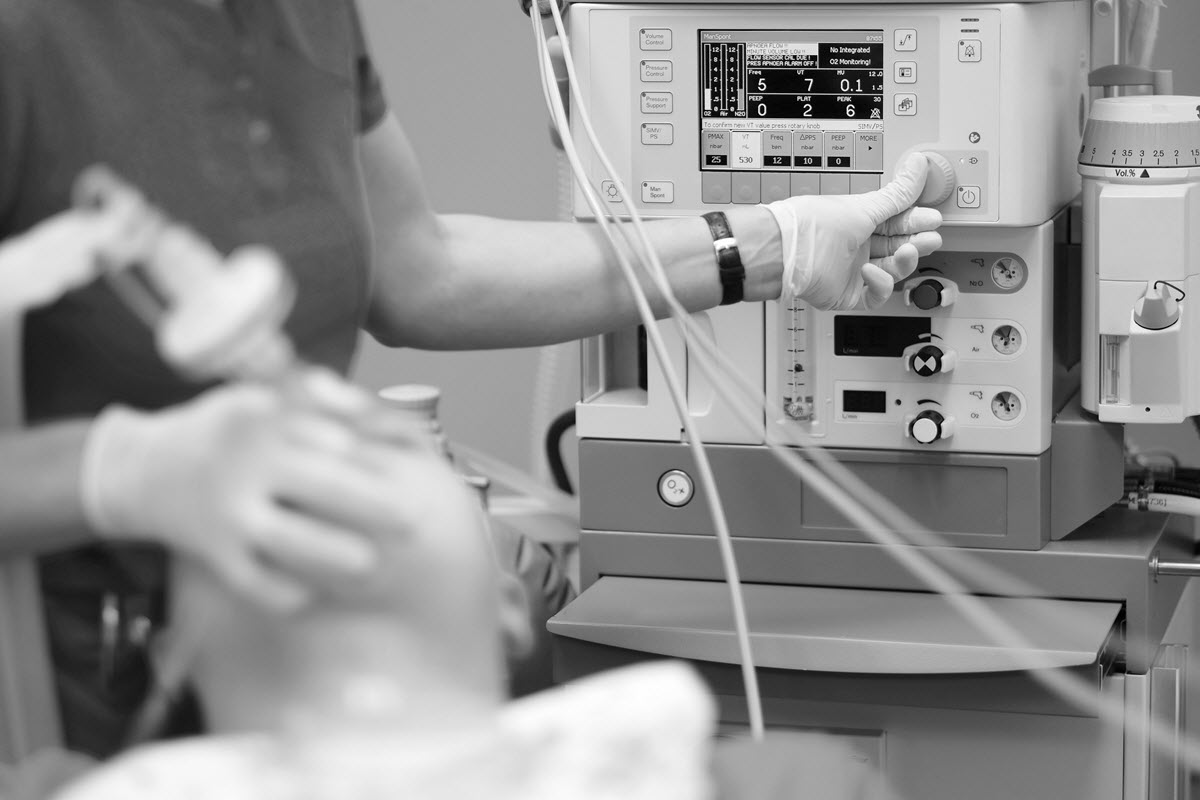
What is sedation dentistry?
Sedation dentistry encompasses using pharmacological agents to calm and relax a patient before and during a dental appointment, enhancing the treatment experience and improving the patient’s outlook towards dental care.
Application and Techniques:
- Inhalation Sedation: Nitrous oxide, commonly referred to as laughing gas, is administered through a mask. It helps in reducing patient anxiety and wears off quickly post-procedure.
- Oral Sedation: Oral sedatives are administered in pill or liquid form and are taken before the appointment to help patients feel calmer. According to Brisbane Paediatric Dentist, anaesthetists may provide children with oral sedation before general anaesthesia to make the process smoother and more comfortable for them.
- IV Sedation: Intravenous sedation provides a deeper level of sedation, and its effects are felt more quickly than other methods.
- General Anesthesia: It renders the patient completely unconscious. This method is reserved for extensive dental procedures like dental implants, wisdom teeth removal or patients with extreme dental anxiety.
Levels of Sedation:
- Minimal Sedation: Patients are relaxed yet fully aware and awake.
- Moderate Sedation: Patients remain conscious but may not remember much of the procedure.
- Deep Sedation: Patients are on the edge of consciousness but can still be awakened.
- General Anesthesia: Patients are completely unconscious.
Benefits:
- Eases anxiety and fear, enabling patients to receive necessary dental care.
- Reduces the memory of the procedure, which can be beneficial for patients with dental phobias.
- Enables more work to be completed in fewer appointments as patients are at ease.
Safety and Regulation: Sedation dentistry should be conducted under the strict supervision of qualified and trained dental professionals who adhere to the regulatory guidelines set forth by dental governing bodies. The administration of sedation should be tailored to the individual’s medical history and current health status to ensure safety.
Sedation Dentistry in Brisbane: a substantial number of dental practices have adopted this approach to cater to individuals with dental anxieties or those needing extensive dental work. This trend underscores the growing recognition of sedation dentistry as a safe and effective approach to enhance patient compliance and comfort during dental procedures.
Is sedation dentistry safe?
Here are some points regarding the safety of sedation dentistry:
- Professional Administration: When administered by trained and experienced dental professionals, sedation is generally considered to be safe. They monitor vital signs and ensure that the right level of sedation is maintained during the procedure.
- Individual Assessment: Safety also depends on the individual’s health condition. People with certain medical conditions or on specific medications may face more risks. A thorough medical history review and a pre-sedation assessment can help mitigate these risks.
- Proper Equipment and Training: Dental practices equipped with the necessary emergency equipment and staffed by trained personnel can respond effectively to any adverse reactions to sedation, enhancing safety.
- Follow Instructions: Patients should carefully follow pre- and post-sedation instructions, such as fasting guidelines and arranging for someone to drive them home.
- Different Levels of Sedation: The level of sedation (minimal, moderate, deep, or general anesthesia) must be appropriate for both the patient and the procedure.
- Certification and Regulations: In many areas, dental offices must be certified for administering sedation, which entails having the necessary equipment and training to ensure patient safety.
- Consultation: It’s advisable to have a detailed discussion with your dentist about their sedation techniques, their experience, and the risks involved.
Lastly, sedation dentistry can significantly ease anxiety for individuals who fear dental procedures, making it a beneficial option for many.
Will I feel any pain while under sedation?
When under sedation during a dentistry procedure, you will likely experience minimal to no pain. The level of comfort depends on the degree of sedation administered. There are different levels of sedation: minimal, moderate, deep, and general anesthesia. As the level of sedation increases, your consciousness and ability to feel pain decreases.
- Minimal Sedation: You will be awake but relaxed. You may still feel some discomfort or mild pain.
- Moderate Sedation: You might slur your words when speaking and not remember much of the procedure. Your sense of pain is further diminished.
- Deep Sedation: You’ll be on the edge of consciousness but can still be awakened. It’s unlikely that you’ll feel any pain.
- General Anesthesia: You will be completely unconscious and feel no pain during the procedure.
Your dentist or sedation specialist will determine the appropriate level of sedation to ensure your comfort and safety during the procedure.
What types of sedation are used in paediatric dentistry?
Local Anesthesia:
- While not a sedative, paediatric dentists often use local anesthesia to numb the area being worked on to prevent pain. It can be used in conjunction with the mentioned sedation methods.
Nitrous Oxide (Laughing Gas):
- Nitrous oxide, or “laughing gas,” is often used to help children relax during dental procedures. It’s mixed with oxygen and administered through a mask that fits over the nose. The effects are mild and wear off quickly once the mask is removed.
General Anesthesia:
- In cases where extensive dental work is needed or the child is extremely anxious or uncooperative, general anesthesia may be used. This involves administering medications to make the child fully asleep during the procedure.
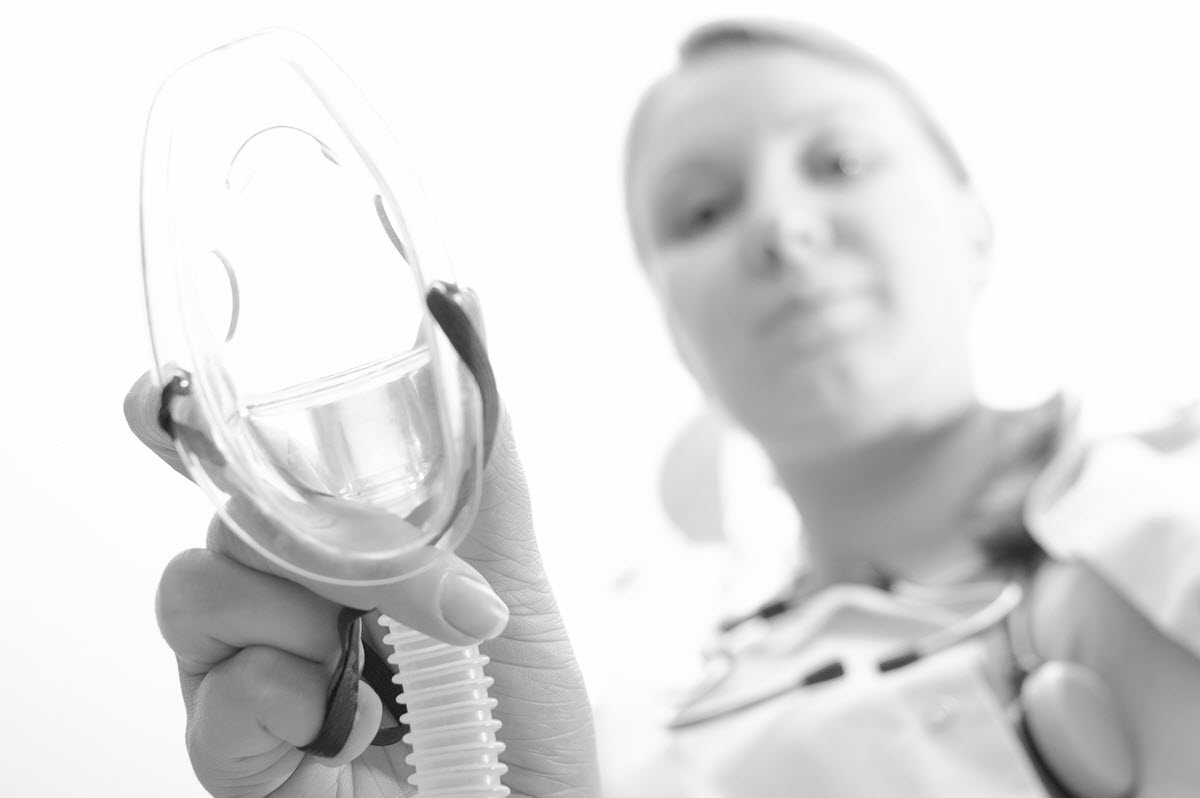
What Is Sleep Dentistry Brisbane?
So, you might be wondering: What exactly is sleep dentistry? At its core, sleep dentistry is a unique approach to ensuring patients stay calm, comfortable, and unconscious during a dental procedure. Especially during more complex or surgical or invasive procedures, it can be quite nerve-wracking for many. Here’s where general anaesthetic steps in.
General anaesthesia will put nervous patients or those with special needs completely asleep. It ensures they don’t experience discomfort or anxiety during the treatment, allowing dental professionals to work more efficiently and ensure optimal oral health outcomes. It’s a compassionate approach that caters to the needs and concerns of every patient.
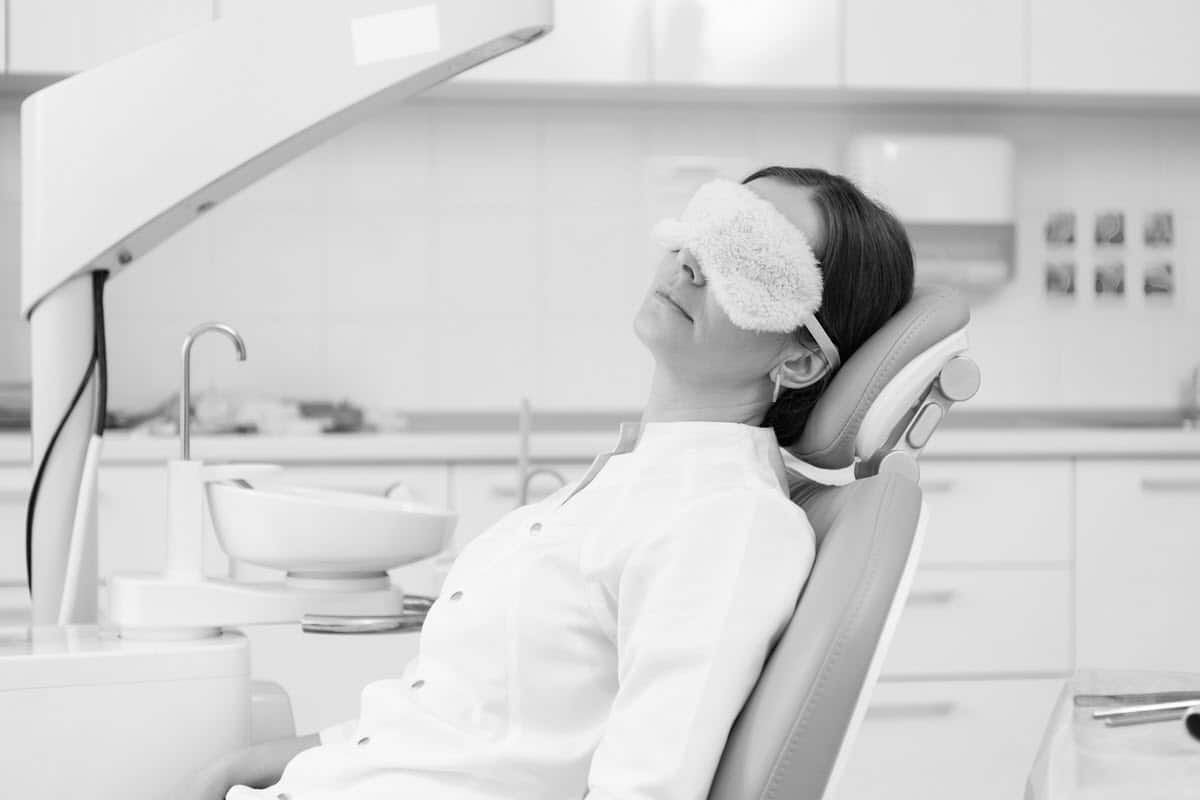
How Is General Anaesthetic Administered?
Have you ever wondered about the behind-the-scenes of sleep dentistry? When you’re at a dentist’s office, one of the most advanced dental sedation options available is the use of general anaesthetic. It isn’t just handed out by any dentist but administered by specialist anaesthetists who have trained extensively for this purpose. It involves the careful administration of a combination of sedative and pain-relieving drugs to ensure the patient is deeply asleep and free of discomfort.
Now, who typically requires this approach? It’s tailored for patients who might be undergoing extensive treatment or those who experience dental anxiety or a dental phobia. Furthermore, it’s an excellent option for those with a hypersensitive gag reflex or severe anxiety. For the entire procedure, rest assured you’ll be under the watchful eyes of skilled professionals, ensuring everything goes smoothly.
Unlike lighter sedation methods like happy gas (nitrous oxide) or IV sedation, general anaesthetic ensures that the patient is wholly asleep, unaware of their surroundings, and feels nothing. Sometimes, this might even occur in a hospital setting to guarantee the utmost care and safety, especially for longer or multiple procedures.
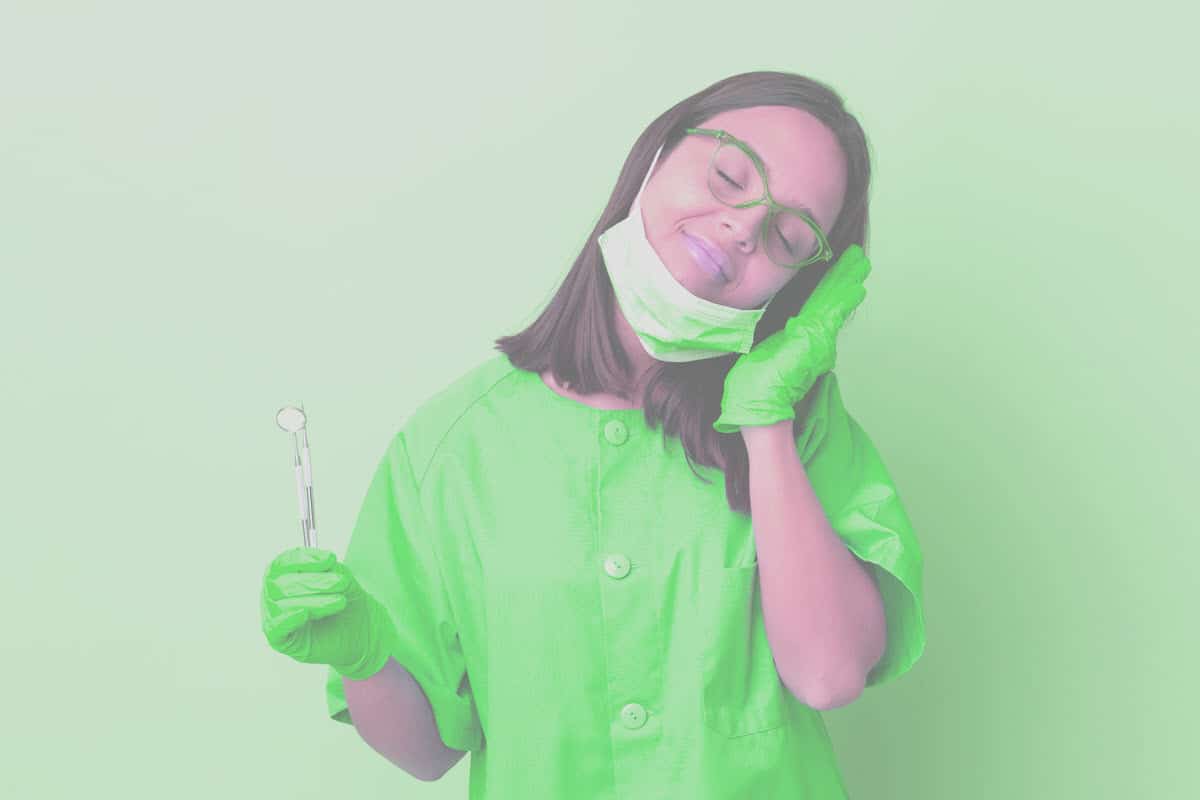
What Are Other Sedation Techniques?
In sedation dentistry, there are several ways to help patients stay calm during a dental treatment. Let’s look at the different sedation options that make visits to the dental clinic easier for those who get nervous.
First up is nitrous oxide sedation, often known as happy gas or inhalation sedation. Happy gas is popular because it helps patients feel calm and deeply relaxed without sending them to dreamland. It’s like being wrapped up in a blanket of calming relaxation – you’re aware, but everything feels distant and muffled. Once the dental procedure is over, the effects of happy gas wear off quickly, allowing you to resume your day without any lingering drowsiness.
Next in line is IV sedation or intravenous sedation. Contrary to what some might think, you aren’t fully asleep with intravenous sedation. Instead, IV sedation places you in a dream-like state, ensuring you’re still responsive and can follow simple instructions during your dental treatments. It is often referred to as twilight sedation or conscious sedation.
You’ll likely remember very little about the dental examination or procedure once it’s over. This method involves administering medication directly into your bloodstream, making it fast-acting. Twilight sedation is a great choice for those with significant dental anxiety, allowing them to undergo regular dental treatment in a stress-free environment.
Is It Safe to Receive General Anaesthesia During Dental Treatment?
While any invasive procedure carries risks, having general anaesthesia during a dental procedure is considered safe for most patients. Ensure an appropriately qualified health practitioner administers it at a reputable dental clinic. They will closely monitor you throughout the treatment to ensure everything goes smoothly.
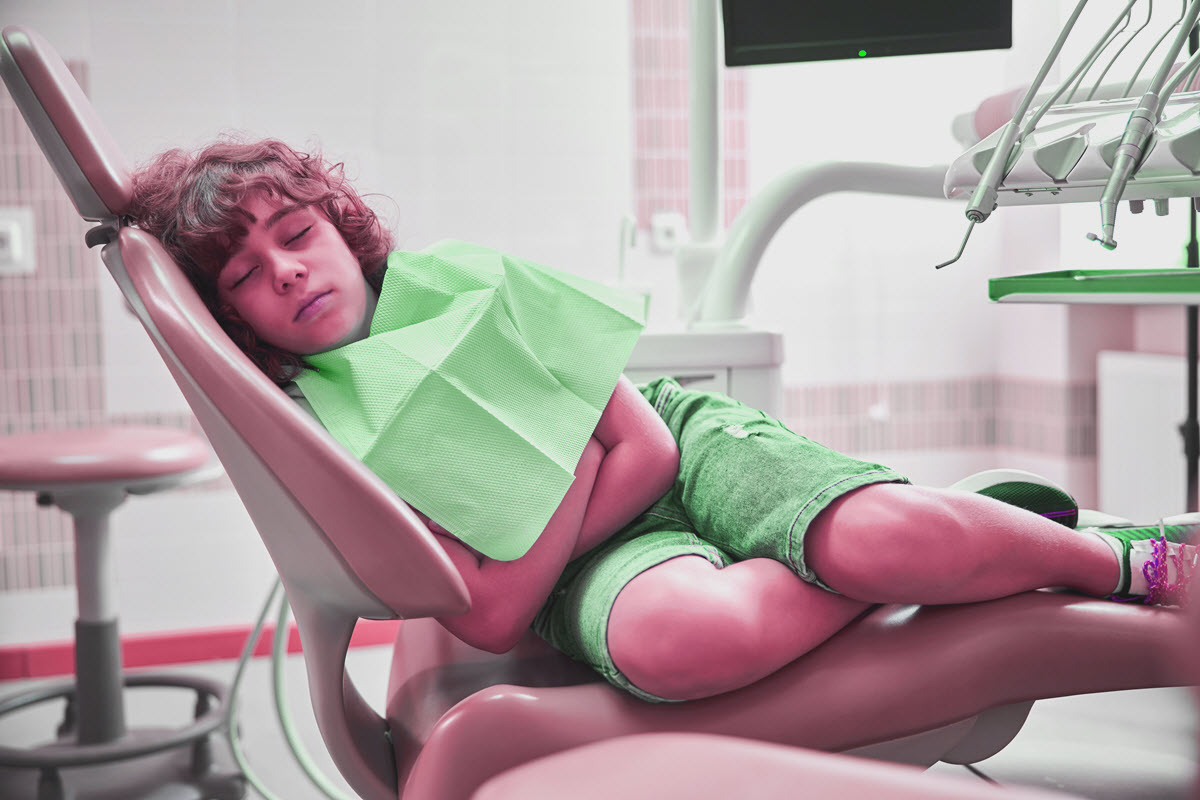
Are There any Conditions or Medications that Can Interfere with Sleep Dentistry?
Some medical conditions and medications might not play nicely with sedation dentistry. Always talk with your dentist beforehand to ensure you’re medically fit for sleep dentistry.
For instance, the sedatives used might pose risks if you have a history of respiratory issues or certain cardiovascular conditions. Moreover, some everyday medications or herbal supplements could react with sedatives, leading to reduced effectiveness or unexpected side effects.
It’s always recommended to be transparent and provide a complete list of medications and health history to your dental professional. It ensures they can tailor the sedation to suit your unique needs and keep the process as safe and smooth as possible.
How Long Does the Effect of Sleep Dentistry Last?
For some patients, the woozy feeling can wear off in a few hours, while others might feel groggy for the rest of the day. Especially after more complex procedures, it’s a good idea to have a responsible adult with you post-treatment.
What Should I Do To Prepare for Dental Procedures with Sleep Dentistry?
Your dentist or paediatric dentist in Brisbane will give you a list of dos and don’ts before your dental appointments. Generally, you might need to fast for a few hours before the procedure and arrange for someone to drive you home after.
Additionally, wearing comfortable clothing and avoiding jewellery or heavy makeup is wise. Ensure to inform your dentist of any medications you’re currently taking, as some might interfere with the sedation. Finally, get a good night’s sleep before the appointment, as feeling rested can aid in a smoother sedation experience and recovery.
Will I Feel any Pain or Discomfort During or After Dental Treatments?
The goal of sedation methods and local anaesthetic is to keep things pain-free. During the treatment, you’ll likely feel nothing. After, there might be some minor discomfort, but it’s usually manageable and short-lived.
Are There Any Post-Procedure Precautions I Should Be Aware of After Receiving Sleep Dental Sedation?
Absolutely! Following your dental visits utilising sedation dentistry, taking some precautions is essential. Firstly, give your body a chance to recuperate; lounging with a good book or a favourite movie might be just the ticket. For at least 24 hours, it’s advised to steer clear of any heavy lifting or strenuous activities, ensuring your body has ample time to recover without any undue strain. Avoid operating heavy machinery, driving, and making important decisions for 24 hours or as advised by the dentist.
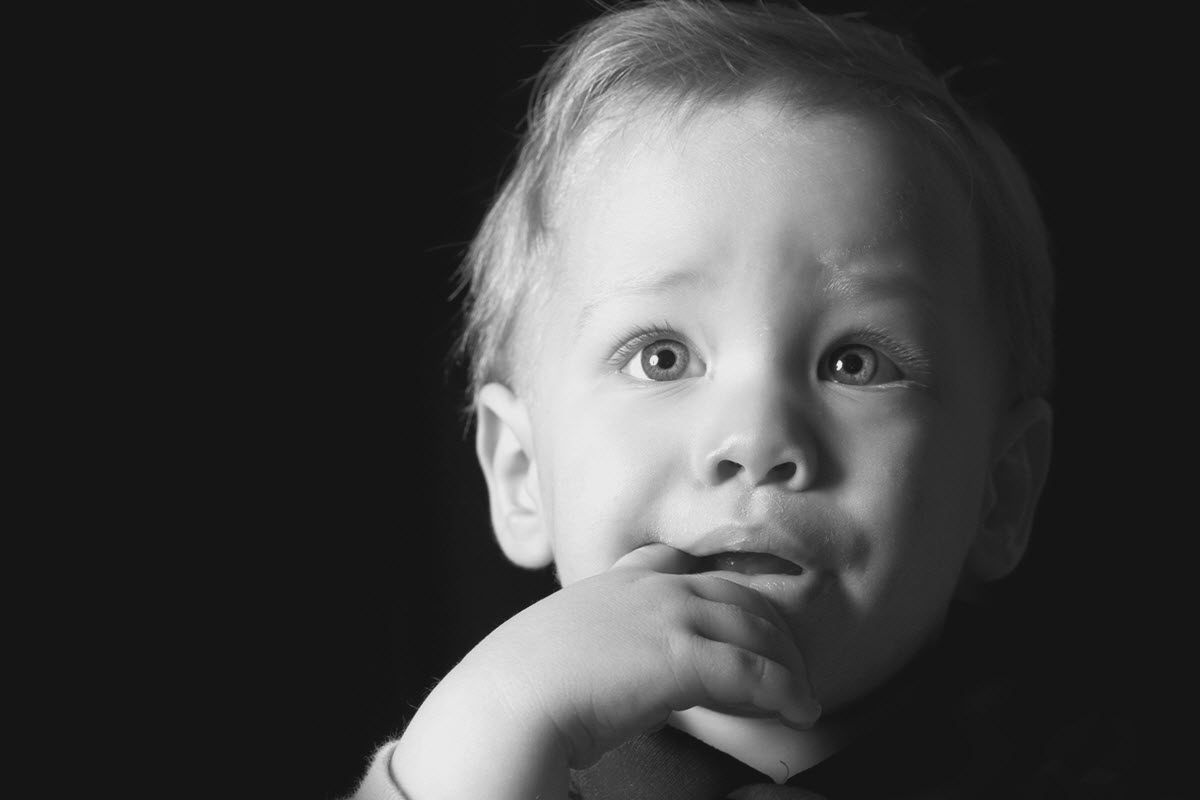
Does Private Health Insurance cover Sleep Dentistry?
It can vary based on your insurance plan and where you are. Many insurers recognise the value of dental health, and some plans cover sleep dentistry. It is always best to check with your provider before scheduling dental appointments.
Can Children Receive Sleep Dentistry?
Yes, according to Brisbane Dentist for Children, kids can benefit from sleep dentistry, especially if they have a dental phobia. Dental clinics specialising in children’s dental care often offer sedation options for our little ones to ensure their dental visits are calm and stress-free. See sleep dentistry using general anaesthesia for children in Brisbane.
Pure Dentistry
Are root canals or surgical procedures giving you sleepless nights? At our dental practice, Pure Dentistry, we believe everyone deserves a relaxed and pain-free dental experience. We prioritise your oral health, and our expertise in pain management ensures that you’re at ease, regardless of the complexity of the procedure. Whether it’s opting for happy gas (nitrous oxide), diving deep with IV sedation, or ensuring complete peace with general anaesthesia, we aim to reduce anxiety and total comfort.
No more stressing over a surgical or invasive procedure! Our dedicated team is committed to ensuring our patients achieve their brightest smiles in the most comfortable way possible. Embrace the future of dentistry, where pain is a thing of the past. Schedule your appointment today by calling 07 3343 4869.

